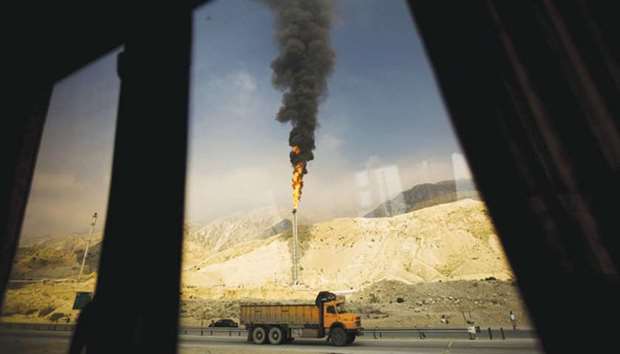Total SA’s decision to stop investing in Iran shows that international companies are going to have trouble doing any business with the Gulf nation, including buying its oil.
Continuing to do business in Iran would be too great a risk as Total has large operations in the US and depends on the country’s banks for financing, it said in a statement on Wednesday. The comments from Total – the first Western oil company to sign binding agreements to develop Iran’s oil and gas fields following the end of a previous round of sanctions in 2015 – illustrate the challenge posed by renewed American restrictions.
The French energy giant, which also buys crude oil for its refineries from the Islamic Republic, won’t commit any more funds to Iran’s South Pars 11 project, in which it took a controlling stake last year. While it is planning to seek a waiver for the Iran project, the company also said it has much more to lose should it be penalised for breaching sanctions.
“The risks of being on the wrong side of the US government are not worth the benefits of trading with Iran once the sanctions are in place,” said Jason Gammel, a London-based analyst at Jefferies LLC. “Oil companies are not going to be able to invest in the upstream sector, traders and purchasers of Iranian crude are going to have to find other sources, or seek an exemption from the US government to be able to continue buying.”
Total could be exposed to so-called secondary sanctions if it continues to do business with Iran, it said. That could affect, among other things, the company’s funding in dollars. US banks are involved in more than 90% of Total’s financing operations, American shareholders represent upward of 30% of its investors and the company has more than $10bn of capital employed in the country, according to the statement.
Total said it “is engaging with the French and US authorities to examine the possibility of a project waiver.” The European Union, also a signatory to the Iran nuclear deal that US President Donald Trump has said he will pull out of, has pledged to take steps to salvage the accord.
“The issue is that Iranian transactions can’t be processed though any part of the banking system that needs access to the US dollar,” Gammel said. “There will be niche players who will far more benefit from trading with Iran than risk from the US system, but it’s going to be a very small set of players that are not going to be particularly well capitalized.”
Total said withdrawing from South Pars 11, in which it had planned to spend the equivalent of $1bn initially, will not affect its target to raise the company’s production by 5% a year between 2016 and 2022. What it left unsaid was the fate of the millions of barrels of crude it purchases from Iran.
The company bought about 56mn barrels for nearly €2.6bn ($3.1bn) last year, primarily for its own refineries, according to its annual report. In addition, about 14mn barrels of oil products were purchased from, or sold to, entities with ties to the Iranian government, generating €1.1bn of revenue, and a net loss of €5.7mn.
Oil refiners, including Spain’s Cia Espanola de Petroleos SAU, and trading houses have started preparing to cut purchases from the Middle Eastern nation after the US reimposed sanctions. One Asian customer said last week their company is already looking for other supplies as the firm has long-term contracts with Iran and needs two to three months to cut purchases and secure alternatives.
Pulling out of the South Pars project could result in Total losing its stake to China National Petroleum Corp, National Iranian Oil Co managing director Ali Kardor said this month. The French company said it has spent less than €40mn on the project so far.
Total had projected an output of 370,000 barrels of oil equivalent a day from the Iran fields, making it the largest on its list of a dozen projects to be given the green light in the two years to 2018. Yet, Total would rather protect its interests outside Iran.

A gas flame is seen through a bus window in the South Pars gas field facilities in the southern Iranian port of Assaluyeh (file). Total, which also buys crude oil for its refineries from Iran, won’t commit any more funds to Iran’s South Pars 11 project, in which it took a controlling stake last year, the company said.
